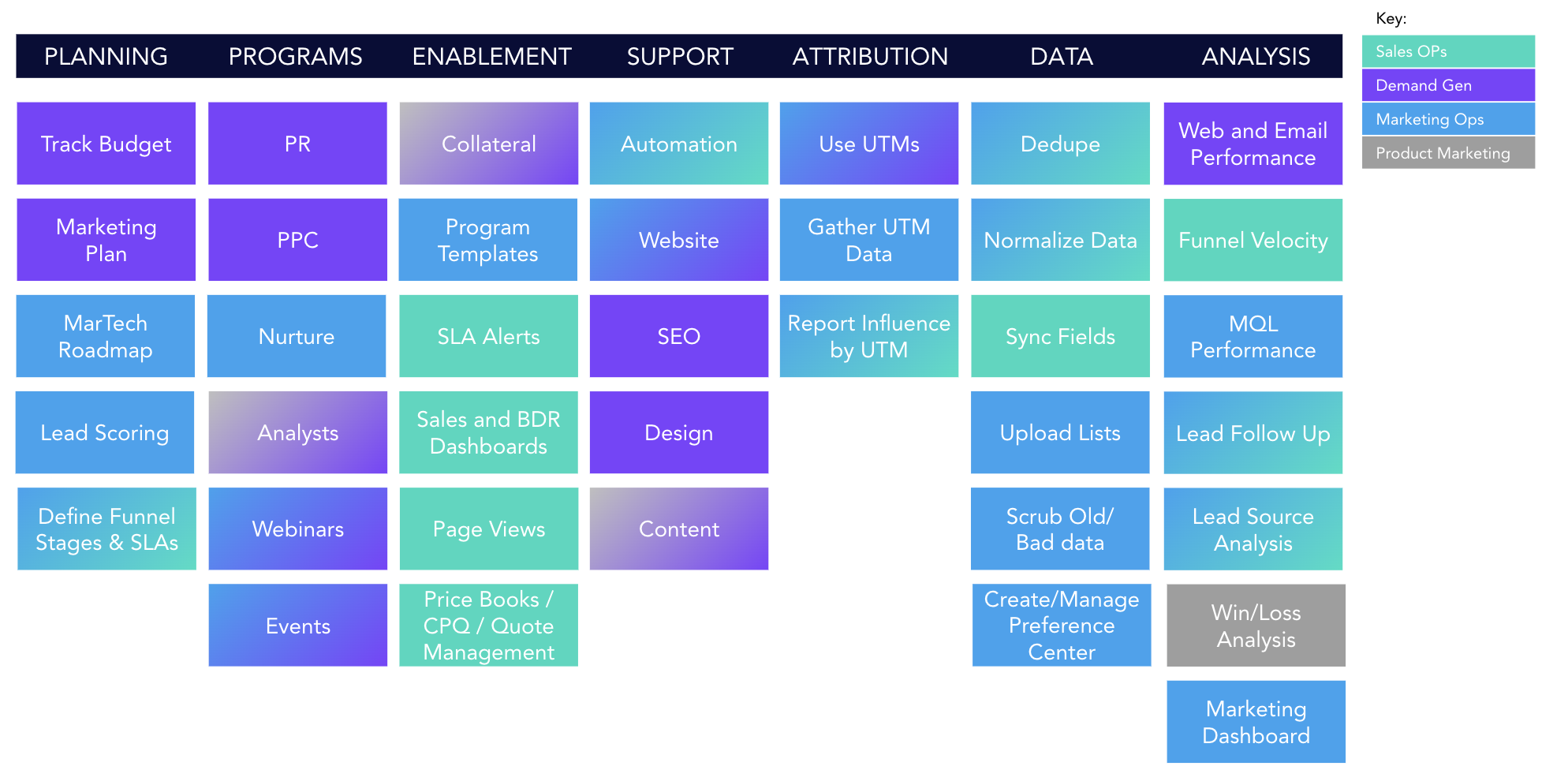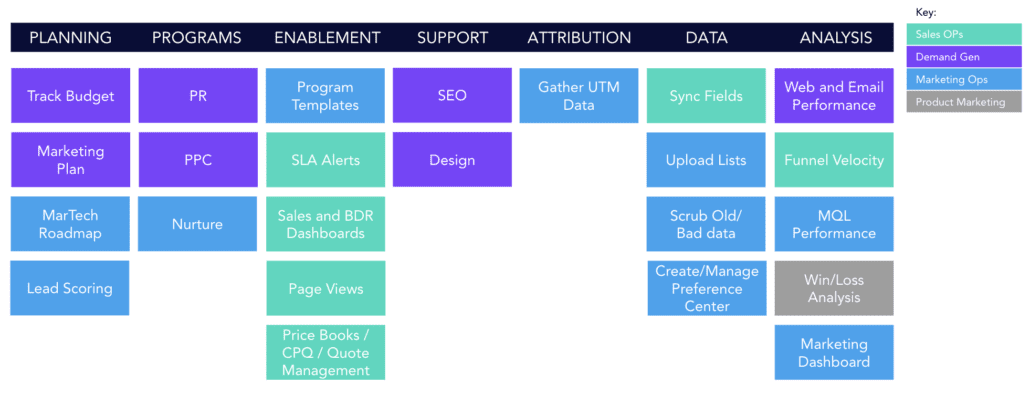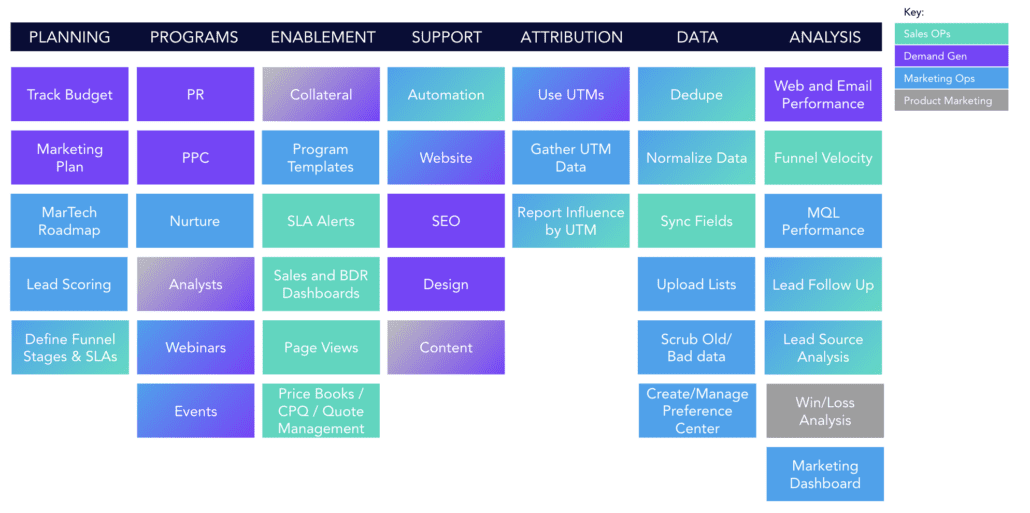Debating if a project “belongs” to MOPs vs Sales Ops, or Demand Gen vs Product Marketing? While most org charts don’t reflect it, Marketing’s success is deeply reliant on Sales Ops and Product Marketing. Savvy marketing leaders should find “friends of marketing” within those departments, and deeply integrate them into planning season, team meetings, and weekly statuses.
Independent, but harmonious
Across Marketing Ops, Sales Ops, Demand Gen, and Product Marketing, we do a lot of siloed activities that “lift all boats”. But that doesn’t mean we shouldn’t brief stakeholders on the processes/projects they rely on:
Click to expand
Tracking budget is a simple example. Usually budgets are managed by Demand Gen because they are spending money the fastest, and to the most varied vendors. But analyst relationships and shiny new martech tools cost a lot. If Demand Gen regularly briefs the broader teams on budget, you’ll avoid panic spending (or eek! cutting) in December.
Another example is lead scoring. This is usually owned by Marketing Ops. But it deeply affects how busy LDR teams are. I’ve also seen kickass event managers scrutinize scores to understand why hot trade show leads haven’t MQLed. Changes to scores should be healthily debated, even if Marketing Ops ultimately decides.
Shared projects across Marketing Ops, Sales Ops, Demand Gen, and Product Marketing
While these campaigns and programs are often driven by a single function, you need each department representing their interests to be successful. Build these project groups with a powerful stakeholder from each team:
For example, something as simple as a webinar actually orchestrates Product Marketing for content, Demand Gen for promotion, and Marketing Ops for execution.
Similarly, Sales Ops and Marketing Ops must tightly share definitions, fields, dashboards, and SLAs (and it’s no coincidence that on very small teams, this role is consolidated into a single headcount). Without regularly syncing – and I do mean weekly – “Are leads being worked!?” is going to be a constant, explosive debate.
In fact, we recommend that Marketing Ops and Sales Ops co-create and widely distribute a master spreadsheet that documents:
- Funnel stages & definitions
- Key fields
- Lead scoring model
- Campaign structure and naming conventions
- Opportunity source logic
- Marketo Interesting Moments
- Triggered email programs
- Ongoing data normalization and deduping
- Lead assignment rules
All together now
In the end, the title of this post is kind of a misnomer: there is no “versus” in MOPs vs Sales Ops, or Demand Gen vs. Product Marketing!
We’re hoping you can use this framework for kickoff, event debriefs, product launches, or even mega annual planning.
FAQs
What is martech?
“Martech” is a term that combines “marketing” and “technology” and refers to the use of technology to support marketing processes and activities.
What does Marketing Ops do?
Marketing Operations, often abbreviated as “Marketing Ops,” is a specialized function within a marketing team or department that focuses on optimizing and streamlining marketing processes, improving efficiency, and enhancing the overall effectiveness of marketing activities.
What does Demand Gen do?
Demand Generation, often abbreviated as “Demand Gen,” is a marketing strategy and function focused on creating awareness and interest in a company’s products or services to generate demand among potential customers. The primary goal of Demand Generation is to drive and nurture leads throughout the sales funnel, ultimately leading to customer acquisition.
What does Sales Ops do?
Sales Operations, often abbreviated as “Sales Ops,” is a specialized function within a sales organization that focuses on supporting and optimizing the sales team’s efficiency and effectiveness. Sales Ops professionals work to streamline processes, leverage technology, and provide insights that enable the sales team to operate more efficiently and achieve better results.








